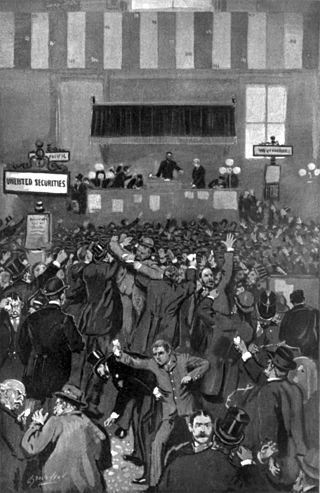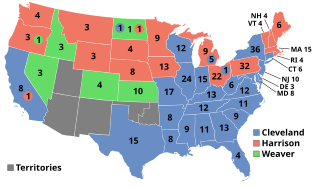
The 1888 United States presidential election was the 26th quadrennial presidential election, held on Tuesday, November 6, 1888. Republican nominee Benjamin Harrison, a former U.S. senator from Indiana, defeated incumbent Democratic President Grover Cleveland of New York. It was the third of five U.S. presidential elections in which the winner did not win the national popular vote, which would not occur again until the 2000 US presidential election.

The 1896 United States presidential election was the 28th quadrennial presidential election, held on Tuesday, November 3, 1896. Former Governor William McKinley, the Republican nominee, defeated former Representative William Jennings Bryan, the Democratic nominee. The 1896 campaign, which took place during an economic depression known as the Panic of 1893, was a political realignment that ended the old Third Party System and began the Fourth Party System.

The Midwestern United States, also referred to as the Midwest or the American Midwest, is one of four census regions of the United States Census Bureau. It occupies the northern central part of the United States. It was officially named the North Central Region by the U.S. Census Bureau until 1984. It is between the Northeastern United States and the Western United States, with Canada to the north and the Southern United States to the south.

The Panic of 1893 was an economic depression in the United States that began in 1893 and ended in 1897. It deeply affected every sector of the economy and produced political upheaval that led to the political realignment of 1896 and the presidency of William McKinley.

Chicago has played a central role in American economic, cultural and political history. Since the 1850s Chicago has been one of the dominant metropolises in the Midwestern United States, and has been the largest city in the Midwest since the 1880 census. The area's recorded history begins with the arrival of French explorers, missionaries and fur traders in the late 17th century and their interaction with the local Pottawatomie Native Americans. Jean Baptiste Point du Sable was the first permanent non-indigenous settler in the area, having a house at the mouth of the Chicago River in the late 18th century. There were small settlements and a U.S. Army fort, but the soldiers and settlers were all driven off in 1812. The modern city was incorporated in 1837 by Northern businessmen and grew rapidly from real estate speculation and the realization that it had a commanding position in the emerging inland transportation network, based on lake traffic and railroads, controlling access from the Great Lakes into the Mississippi River basin.

The 1890 United States House of Representatives elections were held for the most part on November 4, 1890, with five states holding theirs early in between June and October. They occurred in the middle of President Benjamin Harrison's term. Elections were held for 332 seats of the United States House of Representatives, representing 44 states, to serve in the 52nd United States Congress. Special elections were also held throughout the year.
The history of Illinois may be defined by several broad historical periods, namely, the pre-Columbian period, the era of European exploration and colonization, its development as part of the American frontier, its early statehood period, growth in the 19th and 20th centuries, and contemporary Illinois of today.
Quantitative history is a method of historical research that uses quantitative, statistical and computer resources. It is a type of the social science history and has four major journals: Historical Methods, Journal of Interdisciplinary History, the Social Science History, and Cliodynamics: The Journal of Quantitative History and Cultural Evolution.

In the 19th century, a number of new methods for conducting American election campaigns developed in the United States. For the most part the techniques were original, not copied from Europe or anywhere else. The campaigns were also changed by a general enlargement of the voting franchise—the states began removing or reducing property and tax qualifications for suffrage and by the early 19th century the great majority of free adult white males could vote. During the Reconstruction Era, Republicans in Congress used the military to create a biracial electorate, but when the troops were removed in 1877, blacks steadily lost political power in the increasingly one-party Southern United States. After 1890 blacks generally lost the vote in the South.

The Third Party System was a period in the history of political parties in the United States from the 1850s until the 1890s, which featured profound developments in issues of American nationalism, modernization, and race. This period, the later part of which is often termed the Gilded Age, is defined by its contrast with the eras of the Second Party System and the Fourth Party System.
The Bennett Law, officially Chapter 519 of the 1889 Acts of the Wisconsin Legislature, was a controversial state law passed by the Wisconsin Legislature in 1889 dealing with compulsory education. The controversial section of the law was a requirement to utilize the English language as the sole medium of instruction in all schools, whether private or public. Meanwhile, German Catholics and Lutherans, who combined a strong sense of American patriotism with strong ethnic pride, operated large numbers of parochial schools in the state and widely utilized the German language in the United States as the medium of instruction. The Bennett Law was bitterly resented by German Americans, but also by Catholic Polish Americans, and even by Scandinavian immigrant communities. The law was seen not only as an insult to the patriotism of the State's large community of non-English-speaking voters, but also as an unconstitutional attack against the independence of their church denominations and religious schools from control by the State. Although the law was ultimately repealed, there were significant political repercussions in the 1890 and 1892 elections; for the first time in decades Democrats won control of the Legislature and all state-wide elected offices, as well as both U.S. Senate seats and nearly all of Wisconsin's seats in the U.S. House of Representatives.

The Fourth Party System was the political party system in the United States from about 1896 to 1932 that was dominated by the Republican Party, except the 1912 split in which Democrats captured the White House and held it for eight years.

H-Net is an interdisciplinary forum for scholars in the humanities and social sciences. It is best known for hosting electronic mailing lists organized by academic disciplines; according to the organization's website, H-Net lists reached over 200,000 subscribers in more than 90 countries.
Digital history is the use of digital media to further historical analysis, presentation, and research. It is a branch of the digital humanities and an extension of quantitative history, cliometrics, and computing. Digital history is commonly digital public history, concerned primarily with engaging online audiences with historical content, or, digital research methods, that further academic research. Digital history outputs include: digital archives, online presentations, data visualizations, interactive maps, timelines, audio files, and virtual worlds to make history more accessible to the user. Recent digital history projects focus on creativity, collaboration, and technical innovation, text mining, corpus linguistics, network analysis, 3D modeling, and big data analysis. By utilizing these resources, the user can rapidly develop new analyses that can link to, extend, and bring to life existing histories.
This bibliography of William McKinley is a comprehensive list of written and published works about or by William McKinley, the 25th president of the United States.

The 1894 United States elections was held on November 6, and elected the members of the 54th United States Congress. These were mid-term elections during Democratic President Grover Cleveland's second term. The Republican landslide of 1894 marked a realigning election In American politics as the nation moved from the Third Party System that had focused on issues of civil war and reconstruction, and entered the Fourth Party System, known as the Progressive Era, which focused on middle class reforms.

The 1896 United States elections elected the 55th United States Congress. Republicans won control of the presidency and maintained control of both houses of Congress. The election marked the end of the Third Party System and the start of the Fourth Party System, as Republicans would generally dominate politics until the 1930 elections. Political scientists such as V.O. Key, Jr. argue that this election was a realigning election, while James Reichley argues against this idea on the basis that the Republican victory in this election merely continued the party's post-Civil War dominance. The election took place in the aftermath of the Panic of 1893, and featured a fierce debate between advocates of bimetallism and supporters of the gold standard.

The 1892 United States elections was held on November 8, electing member to the 53rd United States Congress, taking place during the Third Party System. Democrats retained the House and won control of the presidency and the Senate. Following the election, Democrats controlled the presidency and a majority in both chambers of Congress for the first time since the 1858 elections.
The following works deal with the cultural, political, economic, military, biographical and geologic history of the Midwestern United States.
Ethnocultural politics in the United States refers to the pattern of certain cultural or religious groups to vote heavily for one party. Groups can be based on ethnicity, race or religion or on overlapping categories. In the South, race was the determining factor. Each of the two major parties was a coalition of ethnoreligious groups in the Second Party System as well as the Third Party System.













